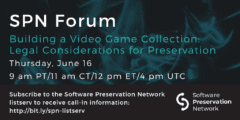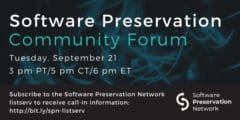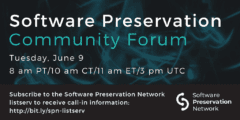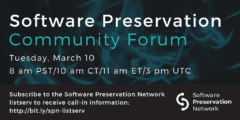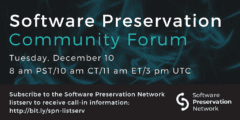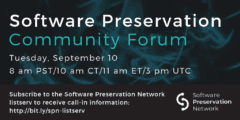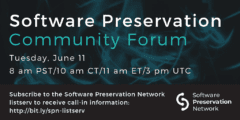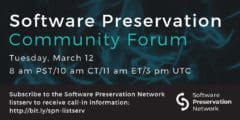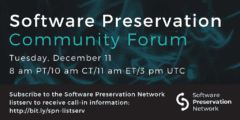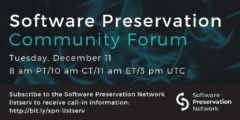Software Preservation Community Forums
The purpose of the Software Preservation Community Forums is to bring together colleagues across professional and disciplinary communities to participate in an hour-long discussion on topics related to software curation, preservation and reuse.
Guides
In collaboration with strategic partners, the Software Preservation Network produces guides that empower practitioners and organizations to make informed decisions.
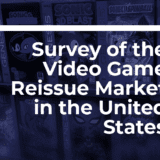
Survey of the Video Game Reissue Market in the United States
About the Survey Video games are part of our cultural history. But while the video game industry and cultural heritage institutions agree that video games should be preserved for both entertainment and study, there is disagreement about whether the commercial …Continue Survey of the Video Game Reissue Market in the United States
Guides, Resources
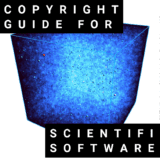
Copyright Guide for Scientific Software
About the Guide This guide covers how to make it easier for others to use your software and how to build on the software that others have written. Today, science involves software. And although many scientists understand that their work …Continue Copyright Guide for Scientific Software
Guides, Resources
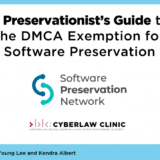
A Preservationist’s Guide to the DMCA Exemption for Software Preservation, 2nd Edition
About the Guide A Joint Product of the Software Preservation Network and the Harvard Cyberlaw Clinic @ the Berkman Klein Center. Every three years the Library of Congress adopts a set of exemptions to the Digital Millennium Copyright Act (DMCA) …Continue A Preservationist’s Guide to the DMCA Exemption for Software Preservation, 2nd Edition
Guides, Resources
Presentations
Software Preservation Network members, affiliated project staff, and backbone staff frequently give presentations to audiences in-person and virtual, large and small. As part of a broader outreach and communication strategy, presentations are one crucial way that SPN can grow the community of practice.
Unacceptable Loss: Video Game Preservation in Libraries and Archives
Join Phil Salvador (Video Game History Foundation), Laine Nooney (NYU and Unboxing Pod) and Meredith Rose (Public Knowledge) to discuss the new report “Survey of the Video Game Reissue Market in the United States” on Tuesday, September 26th at …Continue Unacceptable Loss: Video Game Preservation in Libraries and Archives
Home, Presentations, Resources, Webinars

Towards a Universal Virtual Interactor (UVI) for Digital Objects
Presentation given at iPRES 2019
Presentations, Resources

Participatory Design for Software Preservation and Emulation Services
Presentation given at the International Conference on Digital Preservation (iPRES) 2018
Presentations, Resources

Complex Data Sets, Software Preservation, and Emulation: A distributed approach to long-term care
Presentation given at Research Data Archiving & Preservation (RDAP) Summit 2018
Presentations, Resources

Preparation and Process: Software Preservation and Emulation for Research Data
Emulation is now a practical strategy for preservation and access of software and digital objects in stewarding research data collections. A growing software preservation community is defining good/best practice and developing open source tools that utilize emulation as a central …Continue Preparation and Process: Software Preservation and Emulation for Research Data
Presentations, Resources

Building a Leadership Network Among NDSR Cohorts Panel Discussion
Building a Leadership Network Among NDSR Cohorts Panel Discussion, NDSR Symposium, Washington, D.C.
Presentations, Resources

Software Sustainability and Preservation: Implications for Long-term Access to Digital Heritage
Software Sustainability and Preservation: Implications for Long-term Access to Digital Heritage (p.294), iPRES, Bern, Switzerland
Presentations, Resources

Introduction to the Software Preservation Network
Introduction to the Software Preservation Network, Academic Preservation Trust Member Meeting, Washington, D.C.
Presentations, Resources

Impact on the University as an Information Preservation Organization
“Software Preservation Network: Impact on the University as an Information Preservation Organization“, Archival Education and Research Institute, Pittsburgh, PN.
Presentations, Resources

Investigating Emulation as a Service for Reproducible Research at Yale
Presentation given at the 2020 Librarians Building Momentum for Reproducible Research virtual conference.
Presentations, Resources

An Introduction to Emulation
Presentation at the NYU Institute for Fine Arts’ workshop “Digital Preservation: Caring for Digital Art Objects.”
Presentations, Resources

Software Curation: Intersection of Policy and Practice
Panel presentation at Maintainers III in Washington, D.C. in October 2019 featuring perspectives on the materials that have to be maintained around the software in order to make the software meaningful including: research data curation librarian, service provider, legal expert, …Continue Software Curation: Intersection of Policy and Practice
Presentations, Resources

Participatory Design for Long-term Access: User Research, Software Preservation, and Emulation
EaaSI presentation given at Open Repositories in Hamburg, Germany in June 2019
Presentations, Resources

Software Curation: An Ecosystem of Users, Tools, and Services
Panel presentation at PASIG in Mexico City, Mexico in February 2019 featuring perspectives from different niches in the software curation ecosystem including: software sustinability trainer, software preservation and emulation infrastructure providers, a disciplinary liasion, and a legal expert.
Presentations, Resources

Scaling Software Preservation & Emulation Services
EaaSI presentation at Digital Library Forum in Las Vegas, Nevada in October 2018.
Presentations, Resources

Participatory Design for Software Preservation and Emulation Services
EaaSI presentation given at International Conference on Digital Preservation (iPRES) in Boston, Massachusetts in September 2018
Presentations, Resources

Complex Data Sets, Software Preservation and Emulation: A distributed approach to long-term care
EaaSI presentation at Research Data Archiving & Preservation Summit in Chicago, Ilinois in March 2018
Presentations, Resources
Webinars
- GO
- GO
-
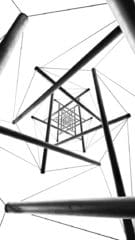 GO
GOSoftware Preservation and Emulation @ Stanford: A Symposium
The symposium seeks to bring together information technology professionals, archivists, curators, librarians, faculty, graduate students, undergraduate students and others willing to share their experiences and contribute their perspectives on software as critical infrastructure and ways to provide long-term access to the software-dependent output of the university. -
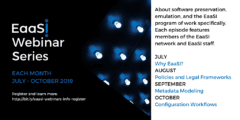 GO
GOEmulators and Configuration Workflows
EaaSI, Episode 4
-
 GO
GOEaaSI Metadata Model and Wikidata
EaaSI, Episode 3
-
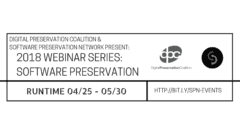 GO
GOSoftware (Re)Use Cases
Episode 3
-
 GO
GOWhy EaaSI? System Overview
EaaSI, Episode 1
-
 GO
GOLegal and Institutional Policy Frameworks
EaaSI, Episode 2
-
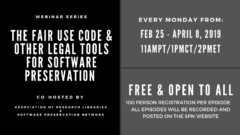 GO
GOInternational Implications
Episode 7
-
GO

-
GO

-
GO

-
GO

-
 GO
GOBeginning the Preservation Workflow
Episode 2
-
GO

-
GO

-
GO

-
GO

-
GO

-
 GO
GOSoftware Collection Development
Episode 2
-
 GO
GOSoftware Preservation Overview
Episode 1
Reports
The Software Preservation Network working groups, affiliated projects, and governance committees produce reports that document the state of the field in different activity areas of software preservation. These reports are issued as authoritative snapshots and include recommendations for further analysis.

Supporting Software Preservation Services in Research and Memory Organizations
Abstract Supporting Software Preservation Services in Research and Memory Organizations identifies concepts, skill sets, barriers, and future directions related to software preservation work. Although definitions of “software” can vary across preservation contexts, the study found that there appears to be …Continue Supporting Software Preservation Services in Research and Memory Organizations
Reports, Resources

Section 108 and Software Collections: A User’s Guide
Abstract This user’s guide explains Section 108 of the U.S. Copyright Act in the context of software collections in libraries and archives. Like fair use, Section 108 of the U.S. Copyright Act provides important rights for libraries and archives engaged in …Continue Section 108 and Software Collections: A User’s Guide
Reports, Resources

Section 30.1 and Software Collections: A Users Guide
Abstract Like fair dealing (Section 29), Section 30.1 of the Copyright Act, known as the “Management and maintenance of collection” exception, places certain software preservation activities by libraries, archives, and museums (LAMs) outside the scope of copyright. Section 30.1 is …Continue Section 30.1 and Software Collections: A Users Guide
Reports, Resources
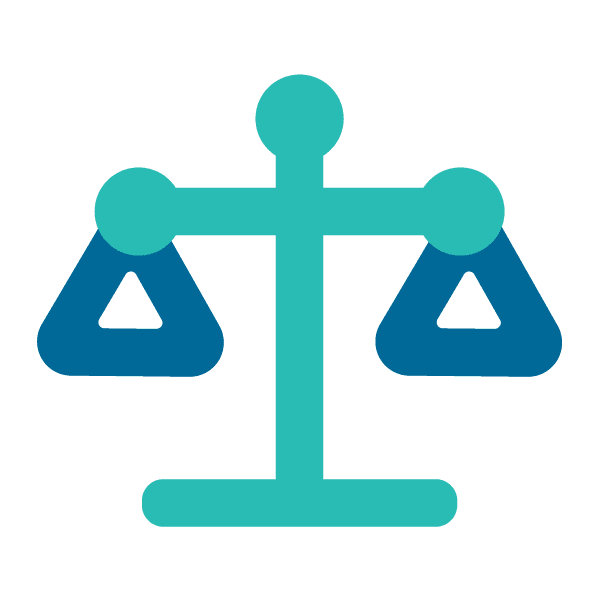
SPN Amicus Brief Defends Fair Use in Apple v. Corellium case
On Wednesday, February 16, the Software Preservation Network filed an amicus brief in Apple v. Corellium, a pivotal copyright lawsuit currently on appeal in the 11th Circuit Court of Appeals in Atlanta. Joining SPN on the brief were the Library …Continue SPN Amicus Brief Defends Fair Use in Apple v. Corellium case
Briefs/Filings, Law Posts, News, Reports, Resources

Software Metadata Recommended Format Guide (SMRF)
Abstract The Software Metadata Recommended Format Guide (SMRF) summarizes and defines the metadata elements recommended by the Software Preservation Network to describe software materials in the context of a wide range of collections. It aims to be adaptable, so that …Continue Software Metadata Recommended Format Guide (SMRF)
Reports, Resources

Google v. Oracle: Takeaways for Software Preservation, Cultural Heritage, and Fair Use Generally (2021 Reflection)
Google v. Oracle: Takeaways for Software Preservation, Cultural Heritage, and Fair Use Generally Prepared for the Software Preservation Network by Brandon Butler On April 5, 2021, the Supreme Court issued its opinion on the long-running litigation between Oracle and Google …Continue Google v. Oracle: Takeaways for Software Preservation, Cultural Heritage, and Fair Use Generally (2021 Reflection)
Law Posts, News, Reports, Resources
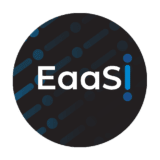
EaaSI Case Study #1: The Would-Be Gentleman
NOTE: EaaSI Case Studies are formatted based on the FCoP Teaching Case Study template developed by Dr. Amelia Acker and published by the Software Preservation Network in June 2020 as part of the IMLS-funded Fostering Communities of Practice project. Name …Continue EaaSI Case Study #1: The Would-Be Gentleman
Reports, Research, Resources

Google v. Oracle Oral Argument: Quick Takeaways for Software Preservation (2020)
Welcome, new readers, to the SPN website! If you’re interested in software preservation and the legal, technical, and social work required to Save Software Together, please take a look at how you can Get Involved and consider joining SPN today! …Continue Google v. Oracle Oral Argument: Quick Takeaways for Software Preservation (2020)
Law Posts, News, Reports, Resources
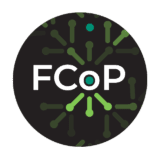
Fostering a Community of Practice at the University of Virginia Library: Final Report
This report summarizes the University of Virginia FCoP project, its outcomes and community building activities, and a set of next steps.
FCoP, Reports, Resources

Research Instruments: “Fostering Communities of Practice: Software Preservation and Emulation in Libraries, Archives and Museums”
The research instruments, including descriptions of data collected from this research can be found at the project’s dataverse in the Texas Data Repository: Acker, Amelia, 2020, “Fostering Communities of Practice: Software Preservation and Emulation in Libraries, Archives and Museums”, https://doi.org/10.18738/T8/U4ZJIJ, …Continue Research Instruments: “Fostering Communities of Practice: Software Preservation and Emulation in Libraries, Archives and Museums”
Reports, Research

PREPRINT Emulation Encounters: Software Preservation in Libraries, Archives, And Museums
If you’re interested in the scholarly study of emulation in digital preservation workflows or learning more about the FCOP cohort as a community of practice, you can read the preprint of “Emulation Encounters: Software Preservation in Libraries, Archives, And Museums,” …Continue PREPRINT Emulation Encounters: Software Preservation in Libraries, Archives, And Museums
FCoP, Reports, Research, Resources

Emulation Practices in Place: Coordinating Software Preservation in Libraries, Archives, and Museums
If you are an information professional currently involved in implementing or planning software preservation programs and want to learn more about implementing emulation services, check out the report from this fieldwork, “Emulation Practices in Place: Coordinating Software Preservation in Libraries, …Continue Emulation Practices in Place: Coordinating Software Preservation in Libraries, Archives, and Museums
FCoP, Reports, Research, Resources

EaaSI Wikidata Report: January 2020
This report describes the current state of entity data in the Wikidata knowledge base for the domain of computing between January 2018 and January 2020.
Reports, Resources

EaaSI Wikidata Report: October 2019
This report describes the current state of entity data in the Wikidata knowledge base for the domain of computing between January 2018 and October 2019.
Reports, Resources

EaaSI Wikidata Report: July 2019
This report describes the current state of entity data in the Wikidata knowledge base for the domain of computing between January 2018 and July 2019.
Reports, Resources

EaaSI Wikidata Report: April 2019
This report describes the current state of entity data in the Wikidata knowledge base for the domain of computing between January 2018 and April 2019.
Reports, Resources

3D/VR in the Academic Library: Emerging Trends and Practices
3D/VR Preservation: Drawing on a Common Agenda for Collective Impact Digital curation is now part of the repertoire of all computationally dependent domains, requiring mechanisms for alignment to address common digital curation challenges that are beyond the scope of any …Continue 3D/VR in the Academic Library: Emerging Trends and Practices
Reports, Resources

EaaSI Wikidata Report: January 2019
This report describes the current state of entity data in the Wikidata knowledge base for the domain of computing between January 2018 and January 2019.
Reports, Resources

EaaSI Wikidata Report: October 2018
This report describes the current state of entity data in the Wikidata knowledge base for the domain of computing between January 2018 and October 2018.
Reports, Resources

EaaSI Wikidata Report: July 2018
This report describes the current state of entity data in the Wikidata knowledge base for the domain of computing between January 2018 and July 2018.
Reports, Resources

EaaSI Wikidata Report: April 2018
This report describes the current state of entity data in the Wikidata knowledge base for the domain of computing January, 2018 to April, 2018.
Reports, Resources

Exploring Curation-ready Software: Use Cases
The Curation Ready Software working group endeavors to develop use-case driven guidelines for improving the quality of preserved software given available resources (“curation-readiness”), including expertise, technical infrastructure, and time.The Software Preservation Network’s Curation-ready Software working group endeavors to develop use-case …Continue Exploring Curation-ready Software: Use Cases
Reports, Resources

Exploring Curation-ready Software: Improving Curation-readiness
This report is a continuation of Exploring Curation-ready Software: Use Cases by Rios et al. (2017) The Software Preservation Network’s Curation-ready Software working group endeavors to develop use-case driven guidelines for improving the quality of preserved software given available resources …Continue Exploring Curation-ready Software: Improving Curation-readiness
Reports, Resources
Templates
In every aspect of the Software Preservation Network’s activities, we strive to abstract away useful and generalizable processes that aid in localized reflection on which activities are possible and in what sequence.
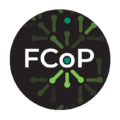
FCoP Teaching Case Study Template
Name of Case Study Catchy, fun, piques the reader’s interest Open question: does it include the software/hardware emulated? Unit + Institution’s name Team or unit that lead the emulation program and the institution where the team is located. Unit members …Continue FCoP Teaching Case Study Template
FCoP, Research, Resources, Templates

In-Person Meeting Exercises
EaaSI Node Leads convened in November 2018 to review the EaaSI beta implementation process, discuss service design for emulation in local organizational contexts, prioritize project activities and review the Participation Agreement drafted in partnership with the Harvard Law School Cyberlaw …Continue In-Person Meeting Exercises
Resources, Templates

Software Collections Inventory
EaaSI Software Collections Inventory is what is sometimes referred to as a Random (or spot) inventory. Random (or spot) inventories are extremely limited in scope. They are primarily used to verify the location of a representative sampling of objects. They …Continue Software Collections Inventory
Resources, Templates

Scenarios for (Re)Use & Access
EaaSI Scenarios for Use & Access asks each Node Host to brainstorm scenarios for use and access they believe will drive the adoption of EaaSI; identify users whose use cases they believe may correspond with the scenarios for use and …Continue Scenarios for (Re)Use & Access
Resources, Templates

Semi-Structured Interviews
EaaSI Scenarios for Use & Access asks each Node Host to brainstorm scenarios for use and access they believe will drive the adoption of EaaSI; identify users whose use cases they believe may correspond with the scenarios for use and …Continue Semi-Structured Interviews
Resources, Templates

In-Person Kickoff Exercises
FCoP Project Leads assembled at the Computer History Museum in Mountain View, CA in August 2018. The 2-day In-Person Kick-Off Meeting was an opportunity for cohort members to examine their software preservation projects through the lens of metadata, existing digital curation …Continue In-Person Kickoff Exercises
Resources, Templates

Exploring our Emulation Environment
The purpose of the “Exploring our Emulation Environment” exercise is to unpack and reflect on the range of curatorial decisionmaking required to configure an emulation environment. Participants are asked to consider metadata and technical challenges, as well as, use cases …Continue Exploring our Emulation Environment
Resources, Templates

Soup to Nuts: Simulating Software
The purpose of the Soup to Nuts exercise is to revisit your Software & Collection Inventory and Scenarios for Use & Access to determine if those software cases/examples are still the cases/examples that you want to configure and test in …Continue Soup to Nuts: Simulating Software
Resources, Templates

Prioritizing Software
This purpose of Prioritizing Software is to expose Node Hosts to National Software Reference Library software categories and their contribution to the EaaSI seed library; to provide an overview of the EaaSI software configuration workflow; and to connect the software …Continue Prioritizing Software
Resources, Templates

Prioritizing Features
This purpose of Prioritizing Features is to encourage Node Hosts to articulate and prioritize possible features for each feature category of the EaaSI system including Search/Discovery Resource Import Environment Configuration Metadata/Description User Management User Interface Network Capabilities Data Management Access …Continue Prioritizing Features
Resources, Templates

Envisioning Local Services
This purpose of the Envisioning Local Services exercise is to help your organization consider the specifics of the local service environment and create a list of short, medium and long-term goals that will help to bring software preservation and emulation …Continue Envisioning Local Services
Resources, Templates

Six Month Software Curation Plan
The purpose of this session is to develop a clearer sense of the project-specific and cohort goals over the next six months.
Resources, Templates

Scenarios for Use & Access
The purpose of the Scenarios for Use and Access exercise is to articulate potential software (re)use and access scenarios, and to inform/verify your assumptions regarding (re)use and access scenarios by observing an end user.
Resources, Templates

Baseline Cost Measurement
This purpose of the baseline cost calculator is to capture as much granular information about the costs of software preservation in different organizational contexts as possible – inlcuding start-up costs. We understand that every organization will vary in terms of …Continue Baseline Cost Measurement
Resources, Templates
Bibliography
“Software Preservation Bibliography” by Software Preservation Network’s Training & Education Working Group, January 14, 2020.
The Software Preservation Bibliography is a living, curated Zotero library of resources, tools, organizations, and research related to software preservation. Help us to expand this resource by adding a reference to the Bibliography.
All Resources
| Date | Title | Summary | Resource Type | hf:categories | hf:tags |
|---|---|---|---|---|---|
| 01.10.24 | SPN and Library Copyright Alliance Petition for Updated DMCA Rules to Expand Access to Preserved Software | The Software Preservation Network ended 2023 with a bang, filing its first set of arguments in the latest cycle of the triennial DMCA rulemaking. We were represented by our attorneys … | briefs-filings featured-news law-posts spn-news resources home | advocacy ianyl law-policy law-policy-working-group | |
| 12.11.23 | Amicus Brief in Green v. Department of Justice | SPN joined an amicus brief in Green v. DOJ, a lawsuit brought by the online civil rights group Electronic Frontier Foundation against the US government challenging key parts of the … | briefs-filings featured-news law-posts spn-news resources home | advocacy ianyl law-policy law-policy-working-group | |
| 11.02.23 | SPN Supports Proposed Changes to Access to Electronic Works | The Software Preservation Network has submitted comments to the US Copyright Office in support of proposed changes to access to electronic works. You can read more about these proposed changes … | briefs-filings featured-news law-posts spn-news resources home | advocacy ianyl law-policy law-policy-working-group | |
| 10.12.23 | Letter to WIPO SCCR Delegates re pending copyright matters | SPN has joined the Access to Knowledge Coalition (A2K), which represents educators, researchers, students, libraries, archives, museums, other knowledge users, and creative communities around the globe, to urge the 44th … | briefs-filings law-posts spn-news resources | advocacy ianyl law-policy law-policy-working-group | |
| 09.25.23 | Unacceptable Loss: Video Game Preservation in Libraries and Archives | Join Phil Salvador (Video Game History Foundation), Laine Nooney (NYU and Unboxing Pod) and Meredith Rose (Public Knowledge) to discuss the new report “Survey of the Video Game Reissue … | home presentations resources webinars | ||
| 09.11.23 | SPN Joins Library Futures, Everylibrary Institute, ALA, ACRL, and ARL in Filing Amicus Brief in Warhol Fair Use Case | In a closely-watched case involving artist Andy Warhol, the Supreme Court’s opinion refined its fair use approach, emphasizing the importance of using existing works for a new purpose. SPN joined … | briefs-filings law-posts spn-news resources | advocacy ianyl law-policy law-policy-working-group | |
| 06.10.23 | Survey of the Video Game Reissue Market in the United States | About the Survey Video games are part of our cultural history. But while the video game industry and cultural heritage institutions agree that video games should be preserved for both … | Reports | guides resources | |
| 03.23.23 | EaaSI Training Module #8: Beyond the PC – Emulating Closed Systems | Intro to Beyond the PC – Emulating Closed Systems: During this module, participants will learn about: What is a “closed system”, and how does it differ from an “open system”? … | Presentation | resources | eaasi training-education training-module |
| 11.09.22 | Webinar: Copyright Guides for Software Preservation, 2022 | The Law & Policy Working Group created two new resources for the SPN community in summer 2022, Section 108 and Software Collections: A User’s Guide and Section 30.1 and Software … | Webinar | resources | law-policy |
| 11.02.22 | Supporting Software Preservation Services in Research and Memory Organizations | Abstract Supporting Software Preservation Services in Research and Memory Organizations identifies concepts, skill sets, barriers, and future directions related to software preservation work. Although definitions of “software” can vary across … | External | reports resources | research-in-practice |
| 10.24.22 | Fall 2022 Community Forum | Building a Video Game Collection: Community Q&A The Software Preservation Network is building momentum in solidarity with several organizations and communities to win an improved exemption in the Digital Millennium … | Webinar | forums resources | community-engagement-collaborative quarterly-community-forum |
| 08.16.22 | Section 108 and Software Collections: A User’s Guide | Abstract This user’s guide explains Section 108 of the U.S. Copyright Act in the context of software collections in libraries and archives. Like fair use, Section 108 of the U.S. … | External | reports resources | law-policy |
| 08.16.22 | Section 30.1 and Software Collections: A Users Guide | Abstract Like fair dealing (Section 29), Section 30.1 of the Copyright Act, known as the “Management and maintenance of collection” exception, places certain software preservation activities by libraries, archives, and … | External | reports resources | law-policy |
| 08.05.22 | EaaSI Training Module #7: Implementing Metadata Standards | Intro to Implementing Metadata Standards: During this module, participants will learn about: What kind of metadata does EaaSI (the program of work) gather? What metadata has been directly incorporated into … | Presentation | resources | eaasi training-education training-module |
| 06.21.22 | Summer 2022 Community Forum | Building a Video Game Collection: Legal Considerations for Preservation The Software Preservation Network is building momentum in solidarity with several organizations and communities to win an improved exemption in the … | Webinar | forums resources | community-engagement-collaborative quarterly-community-forum |
| 03.18.22 | EaaSI Training Module #6: Building an EaaSI Network | Intro to Building an EaaSI Network: During this module, participants will learn about: What are EaaSI “nodes” and how do they communicate with each other? What is OAI-PMH? What happens … | Presentation | resources | eaasi training-education training-module |
| 02.21.22 | Comments of the Software Preservation Network in re Small Claims Procedures for Library and Archives Opt-Outs and Class Actions | Comments of the Software Preservation Network in re Small Claims Procedures for Library and Archives Opt-Outs and Class Actions (1) October 4, 2021 Thank you for this opportunity to comment … | Briefs/Filings | briefs-filings law-posts spn-news resources | law-policy |
| 02.17.22 | SPN Amicus Brief Defends Fair Use in Apple v. Corellium case | On Wednesday, February 16, the Software Preservation Network filed an amicus brief in Apple v. Corellium, a pivotal copyright lawsuit currently on appeal in the 11th Circuit Court of Appeals … | Briefs/Filings | briefs-filings law-posts spn-news reports resources | advocacy law-policy |
| 01.27.22 | Software Metadata Recommended Format Guide (SMRF) | Abstract The Software Metadata Recommended Format Guide (SMRF) summarizes and defines the metadata elements recommended by the Software Preservation Network to describe software materials in the context of a wide … | Guide | reports resources | metadata metadata-standards training-education |
| 11.29.21 | EaaSI Training Module #5: Disk Images | Intro to Disk Images: During this module, participants will learn about: What is a disk image? How do disk images relate to Software, Content, and Environment resources in EaaSI? What … | Presentation | resources | eaasi training-education training-module |
| 09.02.21 | September 2021 Community Forum | The September 2021 Community Forum featured a discussion about preservation use cases that have gotten a little less attention than their high profile multimedia cousins – focusing on data reproducibility … | Webinar | forums resources | community-engagement-collaborative quarterly-community-forum |
| 07.29.21 | EaaSI Training Module #4: Emulation, Virtualization, Containerization | Intro to Emulation, Virtualization, Containerization: During this module, participants will learn about: What is the difference between emulation, virtualization, and containerization? Why does the difference matter for long-term preservation? How, … | Presentation | resources | eaasi training-education training-module |
| 06.03.21 | SPN Signs on to Letter Welcoming US Trade Representative Katherine Tai | In March 2021, the Software Preservation Network, through a proposal from the Law & Policy Working Group approved by the Coordinating Committee, joined a letter to the new US Trade … | Briefs/Filings | briefs-filings law-posts spn-news resources | advocacy law-policy |
| 06.03.21 | Google v. Oracle: Takeaways for Software Preservation, Cultural Heritage, and Fair Use Generally (2021 Reflection) | Google v. Oracle: Takeaways for Software Preservation, Cultural Heritage, and Fair Use Generally Prepared for the Software Preservation Network by Brandon Butler On April 5, 2021, the Supreme Court issued … | Reports | law-posts spn-news reports resources | law-policy |
| 03.30.21 | EaaSI Training Module #3: EaaS|EaaSI Stack | Intro to the EaaS|EaaS Software Stack: During this module, participants will learn about: What are the essential components of the Emulation-as-a-Service (EaaS) stack? How does the EaaSI platform build on … | Presentation | resources | eaasi training-education training-module |
| 02.08.21 | EaaSI Roundtable #1 (2021): “What We Talk About When We Talk About Emulation” | Summary: “What We Talk About When We Talk About Emulation” is a roundtable discussion featuring Eric Kaltman (California State University Channel Islands), Tracy Popp (University of Illinois), and Fernando Rios … | Webinar | resources webinars | eaasi |
| 01.20.21 | EaaSI Training Module #2: Software and Content | Intro to Software and Content Resources: During this module, participants will learn: What is the difference between Software and Content resources? How (and why) does the EaaSI platform treat them … | Presentation | resources | eaasi training-education training-module |
| 01.11.21 | EaaSI Case Study #1: The Would-Be Gentleman | NOTE: EaaSI Case Studies are formatted based on the FCoP Teaching Case Study template developed by Dr. Amelia Acker and published by the Software Preservation Network in June 2020 as … | Reports | reports research resources | case-study eaasi |
| 10.14.20 | EaaSI Training Module #1: Emulation Environments | Intro to Emulation Environments During this module, participants will learn about: Why does the EaaSI team refer to emulation and computing “environments”? What is an EaaSI “Environment” resource? What sort … | Presentation | resources | eaasi training-education training-module |
| 10.13.20 | Google v. Oracle Oral Argument: Quick Takeaways for Software Preservation (2020) | Welcome, new readers, to the SPN website! If you’re interested in software preservation and the legal, technical, and social work required to Save Software Together, please take a look at … | law-posts spn-news reports resources | law-policy | |
| 10.05.20 | SPN Budgetary Framework | Overview SPN has a flexible budgetary framework developed by the Membership & Executive Subcommittee in conversation with membership during the 2019-2020 seed-funded period. The framework allows us to adjust the … | policies publications resources | executive-membership-subcommittee governance steering | |
| 10.05.20 | SPN Resource Publication Policy | Table of Contents: Purpose of this Policy Scope of this Policy Definitions Guiding Principles Publication Oversight Publication Review Process Part I: Review Publication Review Process Part II: Design & Promotion … | Policies | policies resources | governance policies-procedures-committee |
| 10.05.20 | SPN Working Groups Member and Coordinator Responsibilities | Working Groups The SPN Working Groups reflect the five major activity areas of the Software Preservation Network – areas that SPN believes are critical to accomplishing our mission: metadata, law … | Policies | policies resources | governance policies-procedures-committee |
| 10.05.20 | SPN Working Group Formation and Recruitment Procedure | Purpose and Scope This document outlines the process and roles for forming and recruiting people to SPN working groups. It also defines how working group coordinators are appointed. Details on … | policies resources | governance policies-procedures-committee | |
| 10.05.20 | SPN Data Management Policy | Purpose of this Policy Scope of this Policy Guiding Principles Data Management Oversight Definitions Data Ethics and Legal Compliance Acquiring Data Metadata for Data Organization of Data Storage of Data … | Policies | policies resources | governance policies-procedures-committee |
| 10.05.20 | SPN Committee Formation and Recruitment Procedure | Purpose and Scope This document outlines the definition, process and roles for the formation and recruitment of SPN committees. SPN committees are recruited from within the SPN membership and oversee … | Policies | policies resources | governance policies-procedures-committee |
| 09.24.20 | SPN Research & Innovation Framework: Fundraising and Project Framework | Version 1 Prepared by the SPN Research and Innovation Subcommittee of the Steering Committee Document Lead: Aaron Choate, last updated May 13, 2020 Assumptions Grants and other fundraising will play … | policies publications resources | research-innovation-subcommittee steering | |
| 09.24.20 | SPN Research & Innovation Framework: Research and Innovation Continuum | Version 1 Prepared by the SPN Research and Innovation Subcommittee of the Steering Committee Document Lead: Nance McGovern, last updated May 13, 2020 Purpose The SPN Research and Innovation Continuum … | Publication (future) | policies publications resources | research-innovation-subcommittee steering |
| 09.24.20 | SPN Research & Innovation Framework: Incubation of Ideas | Version 1 Prepared by the SPN Research and Innovation Subcommittee of the Steering Committee Document Lead: Sophia Lafferty-Hess, last updated May 13, 2020 Purpose This document outlines (potential) methods and … | Policies | policies publications resources | research-innovation-subcommittee steering |
| 09.24.20 | SPN Research & Innovation Framework: Overview | Version 1 Prepared by the SPN Research and Innovation Subcommittee of the Steering Committee Document Lead: Dianne Dietrich, last updated May 13, 2020 Purpose The Research and Innovation Framework connects … | Policies | policies publications resources | governance research-innovation-subcommittee steering |
| 06.29.20 | FCoP Teaching Case Study Template | Name of Case Study Catchy, fun, piques the reader’s interest Open question: does it include the software/hardware emulated? Unit + Institution’s name Team or unit that lead the emulation program … | fcop research resources templates | roll-up | |
| 06.29.20 | A Guide to FCoP Documentation | Guide | fcop guides resources | fcop | |
| 06.28.20 | Case Study 2 — Atari 2600 Game Hacks | Guide | fcop reports research resources | case-study fcop teaching-resources | |
| 06.28.20 | Living Computers: Scenarios for Use and Access | This completed worksheet describes the Living Computers: Museum + Labs’ scope and outcomes for their Collections and Software Inventory. Information gathered during this exercise includes: Data sources referenced or searched … | Reports | fcop-proj-docs fcop resources | fcop living-computers-museum-labs%e2%80%8b |
| 06.28.20 | Living Computers: Software Collection Inventory Spreadsheet | This spreadsheet catalogs Living Computers: Museum + Labs’ the software and software-dependent items included in their Collections and Software Inventory. Information gathered during this exercise includes: Collection Name or Nickname … | Reports | fcop-proj-docs fcop resources | fcop living-computers-museum-labs%e2%80%8b |
| 06.28.20 | Living Computers: Software Collection Inventory Worksheet | This completed worksheet describes the Living Computers: Museum + Labs’ scope and outcomes for their Collections and Software Inventory. Information gathered during this exercise includes: Data sources referenced or searched … | Reports | fcop-proj-docs fcop resources | fcop living-computers-museum-labs%e2%80%8b |
| 06.28.20 | Guggenheim Museum: Software Collection Inventory Spreadsheet | This spreadsheet catalogs Guggenheim Museum’s the software and software-dependent items included in their Collections and Software Inventory. Information gathered during this exercise includes: Collection Name or Nickname Physical Location or … | Reports | fcop-proj-docs fcop resources | fcop guggenheim-museum |
| 06.28.20 | Guggenheim Museum: Software Collection Inventory Worksheet | This completed worksheet describes the Guggenheim Museum’s scope and outcomes for their Collections and Software Inventory. Information gathered during this exercise includes: Data sources referenced or searched to complete the … | Reports | fcop-proj-docs fcop resources | fcop guggenheim-museum |
| 06.28.20 | Guggenheim Museum: Scenarios for Use and Access | This completed worksheet describes the Guggenheim Museum’s scope and outcomes for their Collections and Software Inventory. Information gathered during this exercise includes: Data sources referenced or searched to complete the … | Reports | fcop-proj-docs fcop resources | fcop guggenheim-museum |
| 06.28.20 | Fostering a Community of Practice at the University of Virginia Library: Final Report | This report summarizes the University of Virginia FCoP project, its outcomes and community building activities, and a set of next steps. | Reports | fcop reports resources | fcop university-of-virginia |
| 06.28.20 | University of Virginia: Scenarios for Use and Access | This completed worksheet describes the University of Virginia’s scope and outcomes for their Collections and Software Inventory. Information gathered during this exercise includes: Data sources referenced or searched to complete … | Reports | fcop-proj-docs fcop resources | fcop university-of-virginia |
| 06.28.20 | University of Virginia: SAA 2019 Multithreading Software Preservation and Emulation Workshop Notes | Shared meeting notes from a workshop on Multithreading Software Preservation and Emulation presented at the 2019 Society of American Archivists conference. | Reports | conf-preso fcop resources | fcop roll-up university-of-virginia |
| 06.28.20 | University of Virginia: SAA 2019 Presentation Slide Deck Slide Deck | Slide deck from a collaborative presentation (with University of Illinois) presented at the 2019 Society of American Archivists conference. | Reports | conf-preso fcop resources | fcop roll-up university-of-virginia |
| 06.28.20 | University of Virginia: World Digital Preservation Day 2019 Presentation Slide Deck | Slide deck for a talk about software preservation, presented by the UVA team at the World Digital Preservation Day events held at the University of Virginia in November 2019. | Reports | conf-preso fcop resources | fcop roll-up university-of-virginia |
| 06.28.20 | University of Virginia: EaaSI Metadata Model V5 | This spreadsheet lists out the types and categories of metadata collected by UVA about different kinds of digital and software object, for use with EaaSI. The spreadsheet includes an individual … | Reports | fcop resources workflow-docs | fcop university-of-virginia |
| 06.28.20 | University of Virginia: Archival Description Strategies for Emulated Software_V1.0 | This document is intended to specifically address description strategies related to born digital content dependent on software for access in the Sheeran Architects Records, as well as the description of … | Reports | fcop resources workflow-docs | fcop university-of-virginia |
| 06.28.20 | University of Virginia: Digital Donor Checklist_V0.4 | This questionnaire and check list is designed to help collect information from donors about collections that are being acquired, especially when the collections contain born digital or software objects. | Reports | fcop resources workflow-docs | fcop roll-up university-of-virginia |
| 06.28.20 | University of Virginia: Systems and Metadata Diagram | This diagram shows the relationships between different systems and repositories in UVA’s systems and metadata workflow. | Reports | fcop resources workflow-docs | fcop university-of-virginia |
| 06.28.20 | University of Virginia: Software Questionnaire V1.0 | This questionnaire document is designed to help gather information from donors and others about the context and content of work. It is meant for collections that have been flagged as … | Reports | fcop resources workflow-docs | fcop roll-up university-of-virginia |
| 06.28.20 | Sustaining Software Preservation Efforts Through Use and Communities of Practice | This paper, presented at the International Digital Curation Conference, describes the University of Arizona’s project and community-centered approach to preservation through use. | Reports | fcop research resources | fcop university-of-arizona%e2%80%8b |
| 06.28.20 | University of Arizona: Software Collection Inventory Worksheet | This completed worksheet describes the University of Arizona’s scope and outcomes for their Collections and Software Inventory. Information gathered during this exercise includes: Data sources referenced or searched to complete … | Reports | fcop-proj-docs fcop resources | fcop university-of-arizona%e2%80%8b |
| 06.28.20 | University of Arizona: Scenarios For Use and Access | This worksheet includes several key sets of work by the University of Arizona team: Detailing scenarios for use and access which includes: Types of stakeholders involved in each use case … | Reports | fcop-proj-docs fcop resources | fcop university-of-arizona%e2%80%8b |
| 06.28.20 | University of Arizona: Born Digital Media Request Workflow | This document describes the steps involved in on-demand born-digital processing at University of Arizona Libraries. Steps include: Initiating a request Acquisition Research and testing Forensic capture and preservation Forensic capture … | Reports | fcop resources workflow-docs | fcop university-of-arizona%e2%80%8b |
| 06.28.20 | University of Arizona: Commodore 64_128 Imaging Workflow | This document outlines the steps required to copy files from and create disk image of disks that were written using the Commodore 64/128. Sections include: Hardware and software requirements Installation/first-time … | Reports | fcop resources workflow-docs | fcop university-of-arizona%e2%80%8b |
| 06.28.20 | University of Arizona: Disk Image Format Primer WIP | This document provides a broad overview on the practical uses of disk images as they pertain to archival practices and workflows. Sections include: What is a disk image? Why are … | Reports | fcop resources workflow-docs | fcop university-of-arizona%e2%80%8b |
| 06.28.20 | University of Arizona: Floppy Disk Workflow | This document describes the University of Arizona workflow for creating disk images of 3.5” and 8” floppy disks. Steps include: Pre-imaging: Cleaning and set-up Installing the Kryoflux and Software (first … | Reports | fcop resources workflow-docs | fcop university-of-arizona%e2%80%8b |
| 06.28.20 | University of Arizona: Guidelines for Storing and Handling Removable Media | This document provides a list of external resources as well as detailed information regarding the storage and handling for magnetic and optical media storage formats including: Floppy disks Internal hard … | Reports | fcop resources workflow-docs | fcop university-of-arizona%e2%80%8b |
| 06.28.20 | University of Arizona: LGIRA Borrower Form | This document is a blank borrower form outlining the terms and conditions associated with borrowing materials from the LGIRA collection. The form also includes information about LGIRA including borrowing locations, … | Reports | fcop resources workflow-docs | fcop university-of-arizona%e2%80%8b |
| 06.28.20 | University of Arizona: Selection for Emulation Criteria | This document is a scan of the LGIRA cataloging procedures for any new items that are added to the collection. There are specific instructions provided for different types of materials, … | Reports | fcop resources workflow-docs | fcop university-of-arizona%e2%80%8b |
| 06.28.20 | University of Arizona: LGIRA Data Entry Procedure | This document is a scan of the LGIRA cataloging procedures for any new items that are added to the collection. There are specific instructions provided for different types of materials, … | Reports | fcop resources workflow-docs | fcop university-of-arizona%e2%80%8b |
| 06.28.20 | University of Arizona: ZoomFloppy Walkthrough Commodore Setup | This document provides instructions for setting up the ZoomFloppy hardware and software, which enables users to connect Commodore 1541/1571/1581 and CBM IEEE-488 drives to a Windows, Mac, or Linux computer. … | Reports | fcop resources workflow-docs | fcop university-of-arizona%e2%80%8b |
| 06.28.20 | University of Arizona: EaaS Sandbox Workflow Instructions | This workflow document outlines the steps for creating an emulation environment in the University of Arizona EaaSI sandbox. The sequence of steps assumes that the user is accessing the service … | Reports | fcop resources workflow-docs | fcop university-of-arizona%e2%80%8b |
| 06.28.20 | University of Arizona: Workflow Documentation Diagram | The diagram refers to the Workflow Documentation master document linked below. | Reports | fcop resources workflow-docs | fcop university-of-arizona%e2%80%8b |
| 06.28.20 | University of Arizona: Workflow Documentation | This LGIRA workflow document includes detailed descriptions of the following stages: Appraisal: Determining the value of materials; can occur prior to or after acquisition Acquisition: Acquiring materials, physical transfer of … | Reports | fcop resources workflow-docs | fcop university-of-arizona%e2%80%8b |
| 06.28.20 | Case Study 1 — Cooking Mama: Foodfight | Guide | fcop reports research resources | case-study fcop teaching-resources | |
| 06.28.20 | Glossary for Emulation in Libraries, Archives, and Museums | Guide | fcop reports research resources | fcop glossary teaching-resources | |
| 06.28.20 | What is Emulation in Libraries, Archives, and Museums? | Guide | fcop reports research resources | fcop overview teaching-resources | |
| 06.28.20 | Teaching Resources | External | fcop research resources | fcop results | |
| 06.28.20 | Research Instruments: “Fostering Communities of Practice: Software Preservation and Emulation in Libraries, Archives and Museums” | The research instruments, including descriptions of data collected from this research can be found at the project’s dataverse in the Texas Data Repository: Acker, Amelia, 2020, “Fostering Communities of Practice: … | External | reports research resources | fcop results |
| 06.28.20 | PREPRINT Emulation Encounters: Software Preservation in Libraries, Archives, And Museums | If you’re interested in the scholarly study of emulation in digital preservation workflows or learning more about the FCOP cohort as a community of practice, you can read the preprint … | Reports | fcop reports research resources | fcop results |
| 06.28.20 | Emulation Practices in Place: Coordinating Software Preservation in Libraries, Archives, and Museums | If you are an information professional currently involved in implementing or planning software preservation programs and want to learn more about implementing emulation services, check out the report from this … | Reports | fcop reports research resources | fcop results |
| 06.26.20 | Georgia Tech: Scenarios for (Re)Use and Access | This worksheet includes several key sets of work by the retroTECH team: Detailing scenarios for use and access which includes: Types of stakeholders involved in each use case Defining the … | Reports | fcop-proj-docs fcop resources | fcop georgia-tech%e2%80%8b |
| 06.26.20 | Georgia Tech: FCoP Project Plan | This document includes a detailed six month project plan which outlines milestones and intermediate sets of work that the retroTECH team undertook to achieve those milestones. | Reports | fcop-proj-docs fcop resources | fcop georgia-tech%e2%80%8b |
| 06.26.20 | Georgia Tech: Kickoff Meeting Lightning Talk | Slide deck from the FCoP 2018 Project Kick-off Meeting at the Computer History Museum in Mountain View, California. | Reports | conf-preso fcop resources | fcop georgia-tech%e2%80%8b roll-up |
| 06.26.20 | Georgia Tech: Oral History Project Interview Packet (Faculty/Staff/Alumni Donors) | This interview packet contains the following: Purpose statement for the retroTECH Software Preservation Oral History Project Procedures, or “what to expect” when participating in an oral history Overview of the … | Reports | fcop resources workflow-docs | fcop georgia-tech%e2%80%8b |
| 06.26.20 | Georgia Tech: Oral History Project Interview Packet (Student Donors) | This interview packet contains the following: Purpose statement for the retroTECH Software Preservation Oral History Project Procedures, or “what to expect” when participating in an oral history Overview of the … | Reports | fcop resources workflow-docs | fcop georgia-tech%e2%80%8b |
| 06.26.20 | Georgia Tech: User Testing Draft Plan | This plan outlines the following: Possible user test types Resources and examples of other user tests in archival projects Potential users and the retroTECH Online stakeholder categories that they correspond … | Reports | fcop resources workflow-docs | fcop georgia-tech%e2%80%8b |
| 06.26.20 | Georgia Tech: User Stories Spreadsheet | This spreadsheet template was used for collective ideation within the retroTECH team. There are five tabs in the spreadsheet: Guiding Question Stakeholder Roles & Definitions User Stories: Priority, Stakeholder Role, … | Reports | fcop resources workflow-docs | fcop georgia-tech%e2%80%8b |
| 06.26.20 | Georgia Tech: User Stories in Zenhub Snapshot | This image provides a snapshot of user story development and prioritization by the team within the retroTECH Online ZenHub account. Because retroTECH Online was partially a software development effort, it … | Reports | fcop resources workflow-docs | fcop georgia-tech%e2%80%8b |
| 06.26.20 | Georgia Tech: Review of the ARL Code of Best Practices | This matrix corresponds to the ARL Code of Best Practices for Software Preservation and the Software Stories that were developed as part of retroTECH Online. The “Situations” listed in the … | Reports | fcop resources workflow-docs | fcop georgia-tech%e2%80%8b |
| 06.25.20 | Georgia Tech: Software Emulation Inclusion Criteria Checklist | This checklist to help the project team identify which pieces of software they want to include in their pilot project. | Reports | fcop resources workflow-docs | fcop georgia-tech%e2%80%8b roll-up |
| 06.25.20 | Computer Organization and Programming, GT CS2110 | This software story contains games and stories from Georgia Tech’s CS2110 course, Computer Organization and Programming. CS2110 offers an introduction to basic computer hardware, machine language, assembly language, and C … | External | external fcop resources software-stories | fcop georgia-tech%e2%80%8b |
| 06.25.20 | Media Device Architecture, GT CS2261 | This software story contains games and stories from Georgia Tech’s CS2261 course, Media Device Architecture. CS2261 covers knowledge related to controlling the interface between hardware and software in media devices, … | External | external fcop resources software-stories | fcop georgia-tech%e2%80%8b |
| 06.25.20 | Ribbit | This software story contains an oral history with Dr. Lance Fortnow, as well as access to a game he created in 1982 called Ribbit. Dr. Fortnow was formerly Chair of … | External | fcop resources software-stories | fcop georgia-tech%e2%80%8b |
| 06.25.20 | Technology Opportunity Analysis | This software story contains oral histories with Dr. Alan Porter and Nils Newman related to software supporting the Technology Opportunities Analysis approach developed at Georgia Tech. A current iteration of … | External | external fcop resources software-stories | fcop georgia-tech%e2%80%8b |
| 06.25.20 | Interactive Media Technology Center Olympic System | This software story contains oral histories with Mike Sinclair and Scott Robertson, digitized footage, and documentation related to the Interactive Media Technology Center’s development of a multimedia system that played … | External | external fcop resources software-stories | fcop georgia-tech%e2%80%8b |
| 06.25.20 | University of Illinois FCoP Software Collection Inventory Worksheet | This completed worksheet describes the University of Illinois’s scope and outcomes for their Collections and Software Inventory. Information gathered during this exercise includes: Data sources referenced or searched to complete … | Reports | fcop-proj-docs fcop resources | fcop university-of-illinois%e2%80%8b |
| 06.25.20 | University of Illinois Code4Lib 2019 Slide Deck | Slide deck from the FCoP cohort’s presentation “Cohort4Lib” at the 2020 Code4Lib conference. | Reports | conf-preso fcop resources | fcop roll-up university-of-illinois%e2%80%8b |
| 06.25.20 | University of Illinois Preservation Week Presentation Notes | Presentation notes for talk given about local involvement in and advocacy for FCoP and EaaSI as part of Preservation Week events. | Reports | conf-preso fcop resources | fcop roll-up university-of-illinois%e2%80%8b |
| 06.25.20 | University of Illinois Preservation Week Slide Deck | Slide deck for talk given about local involvement in and advocacy for FCoP and EaaSI as part of Preservation Week events. | Reports | conf-preso fcop resources | fcop roll-up university-of-illinois%e2%80%8b |
| 06.25.20 | University of Illinois Data Interest Group Presentation Notes | Presentation notes for talk given at the University of Illinois Data Interest Group about local involvement in and advocacy for FCoP and EaaSI. | Reports | conf-preso fcop resources | fcop roll-up university-of-illinois%e2%80%8b |
| 06.25.20 | University of Illinois Data Interest Group Presentation Slide Deck | Slide deck for talk given at the University of Illinois Data Interest Group about local involvement in and advocacy for FCoP and EaaSI. | Reports | conf-preso fcop resources | fcop roll-up university-of-illinois%e2%80%8b |
| 06.25.20 | University of Illinois & University of Virginia SAA 2019 Presentation Notes | Notes from a collaborative presentation (with University of Virginia) presented at the 2019 Society of American Archivists conference. | Reports | conf-preso fcop resources | fcop roll-up university-of-illinois%e2%80%8b |
| 06.25.20 | University of Illinois & University of Virginia SAA 2019 Presentation Slide Deck | Slide deck from a collaborative presentation (with University of Virginia) presented at the 2019 Society of American Archivists conference. | Reports | conf-preso fcop resources | fcop roll-up university-of-illinois%e2%80%8b |
| 06.25.20 | University of Illinois Metadata Capture Locations | This spreadsheet is used to capture input or metadata fields from several other assets where information about software or file formats is captured. The intent is that this document can … | Reports | fcop resources workflow-docs | fcop university-of-illinois%e2%80%8b |
| 06.25.20 | University of Illinois Software Inventory Data Dictionary | Document providing some additional explanation on metadata fields found within the 2019_softwareCollection_Inventory_WorkingCopy.xlsx spreadsheet. Software spreadsheet may have evolved since writing. | Reports | fcop resources workflow-docs | fcop university-of-illinois%e2%80%8b |
| 06.25.20 | University of Illinois Collections Software Inventory Spreadsheet | This spreadsheet was developed by FCoP, and completed by the University of Illinois cohort team. It contains metadata fields established by cohort leaders. | Reports | fcop resources workflow-docs | fcop university-of-illinois%e2%80%8b |
| 06.25.20 | University of Illinois Hembrough Software Project Plan | Project plan for managing the Hembrough software collection donation. The plan is divided into four stages, and includes metadata and rationale for choices made in metadata capture and spreadsheet organization. … | Reports | fcop resources workflow-docs | fcop university-of-illinois%e2%80%8b |
| 06.25.20 | University of Illinois Software Collection Inventory Working Copy | Example of a spreadsheet used to capture metadata about software titles. Content is primarily from the Hemborough software donation collection stewarded by Digital Preservation Services. | Reports | fcop resources workflow-docs | fcop university-of-illinois%e2%80%8b |
| 06.25.20 | University of Illinois Software SIP Readme Template | Template for creating a README file to include in a software preservation submission information package. | Reports | fcop resources workflow-docs | fcop university-of-illinois%e2%80%8b |
| 06.25.20 | University of Illinois Software Preservation Procedures Workflow | This document is intended to serve as a master workflow for software preservation practice at the University of Illinois. It outlines the major task categories of acquiring, cataloging, structuring, imaging, … | Reports | fcop resources workflow-docs | fcop university-of-illinois%e2%80%8b |
| 06.25.20 | University of Illinois Software Install Workflow Template | This fillable spreadsheet assists end-users in planning and documenting an install workflow. | Reports | fcop resources workflow-docs | fcop roll-up university-of-illinois%e2%80%8b |
| 06.25.20 | University of Illinois Digital Content Format Registry | This document assists end-users in navigating the Digital Content Format Registry. This is intended for those who want to review the registry entries. The Digital Content Format Registry is open … | Reports | fcop resources workflow-docs | fcop university-of-illinois%e2%80%8b |
| 06.25.20 | University of Illinois High Level Workflow | This document identifies three classes of digital curation action events (media reformatting, software acquisition, digital content format research request) and next steps to starting the curation action. | Reports | fcop resources workflow-docs | fcop university-of-illinois%e2%80%8b |
| 06.25.20 | University of Illinois Addendum To Deed of Gift | Addendum to the deed of gift for electronic records. This document is intended to further disclose issues which a donor may not have with regard to donating their collections and … | Reports | curator-docs fcop resources | fcop university-of-illinois%e2%80%8b |
| 06.25.20 | University of Illinois Donor Guidelines | This document discloses key points to donors as they consider donating their digital materials. Intended to provide transparency and aid in informed consent of content donation, it should be part … | Reports | curator-docs fcop resources | fcop university-of-illinois%e2%80%8b |
| 06.25.20 | University of Illinois Pre-Accession Preservation Appraisal Report | This document provides information on how content and media that a curator is interested in acquiring may be evaluated for preservation concerns. Includes assessing for file format challenges and software … | Reports | curator-docs fcop resources | fcop university-of-illinois%e2%80%8b |
| 06.25.20 | Using EaaSI at University of Illinois: Local Supplement | This document provides additional local information on the use of EaaSI at the University of Illinois libraries. | Reports | curator-docs fcop resources | fcop university-of-illinois%e2%80%8b |
| 06.25.20 | Use of EaaSI at University of Illinois Libraries | This informational document provides a brief overview of emulation, past and present forays into its use and general approach to future use of emulation at the University of Illinois libraries. | Reports | curator-docs fcop resources | fcop university-of-illinois%e2%80%8b |
| 06.08.20 | Software Preservation and Emulation @ Stanford: A Symposium | Every day we all make choices about our individual digital legacies through what we create, keep, and share. Software mediates all of those activities. The 2020 Software Preservation and Emulation … | Webinar | resources webinars | eaasi software-symposium |
| 05.26.20 | Towards a Universal Virtual Interactor (UVI) for Digital Objects | Presentation given at iPRES 2019 | Presentation | presentations resources | eaasi |
| 04.26.20 | Summer 2020 Quarterly Community Forum | Featuring: Virtual roundtable introducing the work of Fostering Communities of Practice (FCoP) cohort members and research themes from FCoP Project Researcher Brief overview of the FCoP project outcomes Brief summary … | Webinar | forums resources uncategorized | quarterly-community-forum roll-up |
| 04.17.20 | Law & Policy Working Group Scope and Action Plan | Scope: The Software Preservation Network endeavors to ensure that cultural memory institutions and related entities can exercise broad and clear legal rights to engage in software preservation (including providing access … | Publication (future) | publications resources | |
| 03.29.20 | Copyright Guide for Scientific Software | About the Guide This guide covers how to make it easier for others to use your software and how to build on the software that others have written. Today, science … | Guide | guides resources | law-policy |
| 03.28.20 | Law & Policy Working Group Scope and Action Plan | Scope: The Software Preservation Network endeavors to ensure that cultural memory institutions and related entities can exercise broad and clear legal rights to engage in software preservation (including providing access … | Publication (future) | publications resources | |
| 03.28.20 | Training & Education Working Group Scope and Action Plan | Scope: The Training & Education Committee develops resources and hosts outreach activities that raise awareness and broaden participation in software preservation. Training & Education plays an important translation role — … | Publication (future) | publications resources | community-engagement-collaborative |
| 03.28.20 | Research-in-Practice Working Group Scope and Action Plan | Scope: In support of the Software Preservation Network’s (SPN) mission to preserve software through community engagement, infrastructure support, and knowledge generation, the Research Working Group facilitates research projects that bring … | Publication (future) | publications resources | |
| 03.28.20 | Technological Infrastructure Working Group Scope and Action Plan | Scope: The Technical Infrastructure Working Group is responsible for understanding, comparing and articulating the infrastructural implications of different software preservation and access approaches. This charge may include specifications for computing … | Publication (future) | publications resources | |
| 03.28.20 | Metadata Working Group Scope and Action Plan | Scope: The Metadata Standards and Policies working group is responsible for developing, promoting and advocating for common metadata frameworks and related metadata standards, vocabularies, and ontologies that support software preservation … | Publication (future) | publications resources | |
| 03.28.20 | SPN Law & Policy Agenda | Goals The Software Preservation Network endeavors to ensure that cultural memory institutions and related entities can exercise broad and clear legal rights to engage in software preservation (including providing access … | Publication (future) | publications resources | advocacy law-policy law-policy-working-group |
| 03.28.20 | Emulators and Configuration Workflows | Summary: This webinar, the last in the EaaSI Webinar Series, is entitled “Emulators and Configuration Workflows” and addresses questions such as: What is your previous experience in using emulation software? Were … | Webinar | resources webinars | eaasi |
| 03.28.20 | EaaSI Metadata Model and Wikidata | This webinar, entitled “EaaSI Metadata Model and Wikidata,” addresses questions such as: How does your organization create, manage or discover metadata about software and related resources now? What would you … | Webinar | resources webinars | eaasi |
| 03.28.20 | Participatory Design for Software Preservation and Emulation Services | Presentation given at the International Conference on Digital Preservation (iPRES) 2018 | Presentation | presentations resources | eaasi |
| 03.28.20 | Complex Data Sets, Software Preservation, and Emulation: A distributed approach to long-term care | Presentation given at Research Data Archiving & Preservation (RDAP) Summit 2018 | Presentation | presentations resources | eaasi |
| 03.28.20 | Participatory Design for Long-Term Access: User Research, Software Preservation, and Emulation | Presentation given at Open Repositories 2019 | pack | resources | eaasi |
| 03.28.20 | EaaSI Tech Talk User Group | More conversational, forum-style technical discussion and troubleshooting among the EaaSI network can also be viewed on the EaaSI Tech Talk Google Group. | pack | external resources | eaasi |
| 03.28.20 | EaaSI GitLab | System requirements and the EaaSI User Handbook will be hosted on GitLab to allow for seamless integration with our development team’s workflows, and easy access for Node Hosts to bug … | pack | external resources | eaasi |
| 03.17.20 | Preparation and Process: Software Preservation and Emulation for Research Data | Emulation is now a practical strategy for preservation and access of software and digital objects in stewarding research data collections. A growing software preservation community is defining good/best practice and … | Presentation | presentations resources | |
| 03.10.20 | Spring 2020 Quarterly Community Forum | Featuring: University of Arizona Software Preservation Campus Interest Group IDCC Software Preservation Track Software Preservation and Emulation for Research Data Curators (Workshop) Sustaining Software Preservation Efforts through Use and Communities … | Forum | forums resources | quarterly-community-forum |
| 03.01.20 | In-Person Meeting Exercises | EaaSI Node Leads convened in November 2018 to review the EaaSI beta implementation process, discuss service design for emulation in local organizational contexts, prioritize project activities and review the Participation … | Template | resources templates | eaasi |
| 03.01.20 | Software Collections Inventory | EaaSI Software Collections Inventory is what is sometimes referred to as a Random (or spot) inventory. Random (or spot) inventories are extremely limited in scope. They are primarily used to … | Template | resources templates | eaasi |
| 03.01.20 | Scenarios for (Re)Use & Access | EaaSI Scenarios for Use & Access asks each Node Host to brainstorm scenarios for use and access they believe will drive the adoption of EaaSI; identify users whose use cases … | Template | resources templates | eaasi |
| 03.01.20 | Semi-Structured Interviews | EaaSI Scenarios for Use & Access asks each Node Host to brainstorm scenarios for use and access they believe will drive the adoption of EaaSI; identify users whose use cases … | Template | resources templates | eaasi |
| 02.29.20 | FCoP Scenarios for (Re)Use & Access Template | Template | fcop templates resources | fcop roll-up | |
| 02.29.20 | In-Person Kickoff Exercises | FCoP Project Leads assembled at the Computer History Museum in Mountain View, CA in August 2018. The 2-day In-Person Kick-Off Meeting was an opportunity for cohort members to examine their software … | Template | resources templates | fcop |
| 02.25.20 | Software Preservation Network project grant application | Software Preservation Network project grant application to the Institute of Museum and Library Services’ National Leadership Grants for Libraries programv | pack | publications resources | |
| 02.25.20 | Software (Re)Use Cases | The “collections as data” initiative centers user communities and use cases in discussions about collection development. This episode highlights research use cases for software collections, and explores whether and how … | Webinar | resources webinars | |
| 02.25.20 | Software Preservation Bibliography | Software Preservation Bibliography” by Software Preservation Network’s Training & Education Working Group, January 14, 2020.The Software Preservation Bibliography is a living, curated Zotero library of resources, tools, organizations, and research related … | publications resources | ||
| 02.25.20 | 3D/VR Preservation: Drawing on a Common Agenda for Collective Impact | “3D/VR Preservation: Drawing on a Common Agenda for Collective Impact” in 3D/VR in the Academic Library: Emerging Practices and Trends, edited by Jennifer Grayburn, Zack Lisher-Katz, Kristina Golubiewski-Davis, and Veronica Ikeshoji. Published … | pack | external resources | |
| 02.25.20 | A Preservationist’s Guide to the DMCA Exemption for Software Preservation, 2nd Edition | About the Guide A Joint Product of the Software Preservation Network and the Harvard Cyberlaw Clinic @ the Berkman Klein Center. Every three years the Library of Congress adopts a … | Guide | guides resources | law-policy |
| 02.25.20 | A Community Effort to Ensure Long Term Access to Digital Cultural Heritage | The Software Preservation Network (SPN): A Community Effort to Ensure Long Term Access to Digital Cultural Heritage, D-Lib Magazine, May/June 2017, Volume 23, Number 5/6 | pack | external resources | |
| 02.25.20 | Software preservationists look ahead to enterprise focus | Software preservationists look ahead to enterprise focus, by Evan Koblentz, TechRepublic, April 17, 2017 | pack | publications resources | |
| 02.25.20 | Software Preservation Network Series: Overview | + Software Preservation Network Series, BLOGGERS! The Blog of SAA’s Electronic Record Section – Overview – Legal and Policy Aspects of Software Preservation – Collecting, Processing, and Providing Access to Software – Prospects in Software … | pack | publications resources | |
| 02.25.20 | Intellectual Property Rights Issues for Software Emulation | Intellectual Property Rights Issues for Software Emulation: An Interview with Euan Cochrane, Zach Vowell, and Jessica Meyerson, by Erin Engle, The Signal, January 22, 2016 | pack | publications resources | |
| 02.25.20 | Software Preservation Networks: A Model for Perpetual Access to Proprietary File Formats | “Software Preservation Networks: A Model for Perpetual Access to Proprietary File Formats”, Society of American Archivists Annual Meeting, Washington, DC. | pack | publications resources | |
| 02.25.20 | Building a Leadership Network Among NDSR Cohorts Panel Discussion | Building a Leadership Network Among NDSR Cohorts Panel Discussion, NDSR Symposium, Washington, D.C. | Presentation | presentations resources | |
| 02.25.20 | Software Sustainability and Preservation: Implications for Long-term Access to Digital Heritage | Software Sustainability and Preservation: Implications for Long-term Access to Digital Heritage (p.294), iPRES, Bern, Switzerland | Presentation | presentations resources | |
| 02.25.20 | Introduction to the Software Preservation Network | Introduction to the Software Preservation Network, Academic Preservation Trust Member Meeting, Washington, D.C. | Forum | presentations resources | |
| 02.25.20 | Impact on the University as an Information Preservation Organization | “Software Preservation Network: Impact on the University as an Information Preservation Organization“, Archival Education and Research Institute, Pittsburgh, PN. | Presentation | presentations resources | |
| 02.25.20 | Software-as-a-Subject, an episode of ‘Lost in the Stacks” | pack | external resources | ||
| 02.20.20 | Exploring our Emulation Environment | The purpose of the “Exploring our Emulation Environment” exercise is to unpack and reflect on the range of curatorial decisionmaking required to configure an emulation environment. Participants are asked to … | Template | resources templates | eaasi resource-highlight |
| 01.28.20 | Investigating Emulation as a Service for Reproducible Research at Yale | Presentation given at the 2020 Librarians Building Momentum for Reproducible Research virtual conference. | Presentation | presentations resources | eaasi |
| 01.01.20 | EaaSI Wikidata Report: January 2020 | This report describes the current state of entity data in the Wikidata knowledge base for the domain of computing between January 2018 and January 2020. | Reports | reports resources | eaasi |
| 12.19.19 | Winter 2019 Quarterly Community Forum | Featuring: Software Heritage Acquisition Process (based on work with the University of Pisa) “Experimental Archaeology of CAD” – Legacy Software and Emulation in the Classroom Silicon Valley Archives GitHub Arctic … | Forum | forums resources | quarterly-community-forum |
| 12.01.19 | Soup to Nuts: Simulating Software | The purpose of the Soup to Nuts exercise is to revisit your Software & Collection Inventory and Scenarios for Use & Access to determine if those software cases/examples are still … | Template | resources templates | eaasi |
| 10.31.19 | EaaSI Wikidata Report: October 2019 | This report describes the current state of entity data in the Wikidata knowledge base for the domain of computing between January 2018 and October 2019. | Reports | reports resources | eaasi |
| 10.11.19 | An Introduction to Emulation | Presentation at the NYU Institute for Fine Arts’ workshop “Digital Preservation: Caring for Digital Art Objects.” | Presentation | presentations resources | eaasi |
| 10.07.19 | Software Curation: Intersection of Policy and Practice | Panel presentation at Maintainers III in Washington, D.C. in October 2019 featuring perspectives on the materials that have to be maintained around the software in order to make the software … | Presentation | presentations resources | eaasi |
| 09.10.19 | Fall 2019 Quarterly Community Forum | Featuring: “How to talk to your organizational legal counsel about software preservation?” Investigating and Archiving the Scholarly Git Experience – how scholars are currently using Git within research and education, … | Forum | forums resources | quarterly-community-forum |
| 08.01.19 | Why EaaSI? System Overview | Summary: This webinar, entitled “Why EaaSI? System Overview,” addresses questions such as: What problem is EaaSI trying to solve? What are EaaSI core functions and underlying design concepts? Why are … | Webinar | resources webinars | eaasi |
| 08.01.19 | Legal and Institutional Policy Frameworks | Summary: This webinar, entitled “Legal and Institutional Policy Frameworks,” addresses questions such as: When you don’t collect software as an object, why do you do it? What role(s) does/do software … | Webinar | resources webinars | eaasi |
| 07.31.19 | EaaSI Wikidata Report: July 2019 | This report describes the current state of entity data in the Wikidata knowledge base for the domain of computing between January 2018 and July 2019. | Reports | reports resources | eaasi |
| 06.13.19 | Participatory Design for Long-term Access: User Research, Software Preservation, and Emulation | EaaSI presentation given at Open Repositories in Hamburg, Germany in June 2019 | Presentation | presentations resources | eaasi |
| 06.11.19 | Summer 2019 Quarterly Community Forum | Featuring: Structured community brainstorm Software Heritage persistent identifiers for software and the “save now” feature The personal and professional journey of an open source software maintainer Computers science students explore … | Forum | forums resources | quarterly-community-forum |
| 04.30.19 | EaaSI Wikidata Report: April 2019 | This report describes the current state of entity data in the Wikidata knowledge base for the domain of computing between January 2018 and April 2019. | Reports | reports resources | eaasi |
| 04.08.19 | International Implications | In this seventh and final episode of a series about using the Code of Best Practices in Fair Use, you’ll learn: Why licensing isn’t a viable solution to copyright issues … | Webinar | bp4fair-use-series resources webinars | bp4fairuse law-policy |
| 04.01.19 | Making the Code Part of Software Preservation Culture | In this sixth episode in a seven-part series about using the Code of Best Practices in Fair Use, you’ll learn: The difference between a document and a shift in practice … | Webinar | bp4fair-use-series resources webinars | bp4fairuse law-policy |
| 03.25.19 | Understanding the Anti-circumvention Rules and the Preservation Exemptions | In this fifth episode in a seven-part series about using the Code of Best Practices in Fair Use, you’ll learn : What the DMCA anti-circumvention provisions are and how they … | Webinar | bp4fair-use-series resources webinars | bp4fairuse law-policy |
| 03.18.19 | Working with Source Code and Software Licenses | In this third episode in a seven-part series about using the Code of Best Practices in Fair Use, you’ll learn about: How fair use enables institutions to provide access to … | Webinar | bp4fair-use-series resources webinars | bp4fairuse law-policy |
| 03.12.19 | Spring 2019 Quarterly Community Forum | Featuring: The growth of research software engineering Preservation Quality Tool IDCC Workshop: From Data Curation to Software Curation: Enhancing Reproducibility and Sustainability of Data and Software Empirical research into How … | Forum | forums resources | quarterly-community-forum |
| 03.11.19 | Making Software Available Within Institutions and Networks | In this third episode in a seven-part series about using the Code of Best Practices in Fair Use, you’ll learn about: How fair use enables institutions to provide access to … | Webinar | bp4fair-use-series resources webinars | bp4fairuse law-policy |
| 03.04.19 | Beginning the Preservation Workflow | In the second episode in the series, speakers cover how to read the Situations in the Code (parsing descriptions, Principles, and Limitations), and explore how fair use applies to the … | Webinar | bp4fair-use-series resources webinars | bp4fairuse law-policy |
| 02.28.19 | 3D/VR in the Academic Library: Emerging Trends and Practices | 3D/VR Preservation: Drawing on a Common Agenda for Collective Impact Digital curation is now part of the repertoire of all computationally dependent domains, requiring mechanisms for alignment to address common … | Forum | reports resources | |
| 02.25.19 | The Code of Best Practices for Fair Use in Software Preservation, Why and How? | In this introduction to the webinar series about using the Code of Best Practices in Fair Use for Software Preservation, you’ll learn: What the Code is What the copyright doctrine … | Webinar | bp4fair-use-series resources webinars | bp4fairuse law-policy |
| 02.13.19 | Software Curation: An Ecosystem of Users, Tools, and Services | Panel presentation at PASIG in Mexico City, Mexico in February 2019 featuring perspectives from different niches in the software curation ecosystem including: software sustinability trainer, software preservation and emulation infrastructure … | Presentation | presentations resources | eaasi |
| 01.31.19 | EaaSI Wikidata Report: January 2019 | This report describes the current state of entity data in the Wikidata knowledge base for the domain of computing between January 2018 and January 2019. | pack | reports resources | eaasi |
| 12.13.18 | DSHR’s Blog: Software Preservation Network | pack | external resources | ||
| 12.11.18 | Winter 2018 Quarterly Community Forum | Featuring: Software Controlled Vocabulary EaaSI In-Person Kick-Off Meeting (use cases, network architecture, governance and more) FCoP Update & SPN Research in Practice Working Group 1201 exemption to break TPMs and … | Forum | forums resources | quarterly-community-forum |
| 11.01.18 | Prioritizing Software | This purpose of Prioritizing Software is to expose Node Hosts to National Software Reference Library software categories and their contribution to the EaaSI seed library; to provide an overview of … | Template | resources templates | eaasi |
| 11.01.18 | Prioritizing Features | This purpose of Prioritizing Features is to encourage Node Hosts to articulate and prioritize possible features for each feature category of the EaaSI system including Search/Discovery Resource Import Environment Configuration … | Template | resources templates | eaasi |
| 11.01.18 | Envisioning Local Services | This purpose of the Envisioning Local Services exercise is to help your organization consider the specifics of the local service environment and create a list of short, medium and long-term … | Template | resources templates | eaasi |
| 10.31.18 | EaaSI Wikidata Report: October 2018 | This report describes the current state of entity data in the Wikidata knowledge base for the domain of computing between January 2018 and October 2018. | pack | reports resources | eaasi |
| 10.17.18 | Scaling Software Preservation & Emulation Services | EaaSI presentation at Digital Library Forum in Las Vegas, Nevada in October 2018. | Presentation | presentations resources | eaasi |
| 09.25.18 | Participatory Design for Software Preservation and Emulation Services | EaaSI presentation given at International Conference on Digital Preservation (iPRES) in Boston, Massachusetts in September 2018 | Presentation | presentations resources | eaasi |
| 09.11.18 | Fall 2018 Quarterly Community Forum | Featuring: Community Standards for 3D Preservation Fostering Communities of Practice cohort projects Conservation of computer-based art at the Guggenheim Museum Software Sustainability Software Deposit Guidelines for Researchers Review notes for … | Forum | forums resources | quarterly-community-forum |
| 08.01.18 | FCoP Software Metadata Template | Template | fcop templates resources | fcop roll-up | |
| 08.01.18 | FCoP Software Collections Inventory Template | Template | fcop templates resources | fcop roll-up | |
| 08.01.18 | Six Month Software Curation Plan | The purpose of this session is to develop a clearer sense of the project-specific and cohort goals over the next six months. | Template | resources templates | fcop |
| 08.01.18 | Scenarios for Use & Access | The purpose of the Scenarios for Use and Access exercise is to articulate potential software (re)use and access scenarios, and to inform/verify your assumptions regarding (re)use and access scenarios by … | Template | resources templates | fcop |
| 08.01.18 | FCoP Documenting Digital Curation Template | Template | fcop templates resources | fcop roll-up | |
| 08.01.18 | Baseline Cost Measurement | This purpose of the baseline cost calculator is to capture as much granular information about the costs of software preservation in different organizational contexts as possible – inlcuding start-up costs. … | Template | resources templates | eaasi |
| 07.31.18 | EaaSI Wikidata Report: July 2018 | This report describes the current state of entity data in the Wikidata knowledge base for the domain of computing between January 2018 and July 2018. | Reports | reports resources | eaasi |
| 07.18.18 | Software Preservation and Public Accountability: Moving the Needle | This episode explores the coupling of software preservation to public accountability – and explore the role of community governance on the one hand and the design of information systems on … | Webinar | resources webinars | |
| 07.11.18 | Overview of Current Trends and Their Legal Implications | This episode provides an overview of copyright and other legal considerations surrounding software preservation, sharing and reuse. Guests explore the “square peg, round hole” relationship between software and copyright; and … | Webinar | resources webinars | |
| 07.01.18 | FCoP Inreach-Outreach Template | Template | fcop templates resources | fcop roll-up | |
| 05.23.18 | Scaling Software Preservation and Emulation | This episode will explore current programmatic and project based initiatives to create the processes and infrastructure that will support a growing number of software (re)use cases/organizational users. Guests will highlight … | Webinar | resources webinars | |
| 05.16.18 | Software in Digital/Scholarly Communications | This episode provides an overview of scholarly communication practices as they relate to software preservation and citation within contemporary scholarly research methods. Attention is paid to evolving and changing practices … | Webinar | resources webinars | |
| 05.02.18 | Software Collection Development | This episode reviews existing software collections and the users of those collections. In order to better capture current efforts in collecting software, Research & Facilitation Lead, Anne-Marie Trepanier, provides different … | Webinar | resources webinars | |
| 04.30.18 | EaaSI Wikidata Report: April 2018 | This report describes the current state of entity data in the Wikidata knowledge base for the domain of computing January, 2018 to April, 2018. | Reports | reports resources | eaasi |
| 04.25.18 | Software Preservation Overview | The Software Preservation Webinar Series provides a survey of software preservation contexts. Each episode explores a different software preservation context by providing an overview, discussion with guest speakers (specialists in … | Webinar | resources webinars | |
| 03.21.18 | Complex Data Sets, Software Preservation and Emulation: A distributed approach to long-term care | EaaSI presentation at Research Data Archiving & Preservation Summit in Chicago, Ilinois in March 2018 | Presentation | presentations resources | eaasi |
| 07.27.17 | Exploring Curation-ready Software: Use Cases | The Curation Ready Software working group endeavors to develop use-case driven guidelines for improving the quality of preserved software given available resources (“curation-readiness”), including expertise, technical infrastructure, and time.The Software … | Reports | reports resources | |
| 07.27.17 | Exploring Curation-ready Software: Improving Curation-readiness | This report is a continuation of Exploring Curation-ready Software: Use Cases by Rios et al. (2017) The Software Preservation Network’s Curation-ready Software working group endeavors to develop use-case driven guidelines … | Reports | reports resources | |
| 07.21.17 | Exploring Curation-ready Software:Improving Curation-readiness | This is the second report of the Software Preservation Network Curation-ready Software Working Group. Seven use cases of software preservation are presented in detail | pack | publications resources | |
| 04.10.17 | Exploring Curation-ready Software: Use Cases | This is the first progress report of the Software Preservation Network Curation-ready Software Working Group. | pack | publications resources | |
| 10.26.16 | Software Preservation Network Series: Community Roadmapping for Moving Forward | pack | external resources | ||
| 10.14.16 | Software Preservation Network Series: Prospects in Software Preservatoin Partnerships | pack | external resources | ||
| 10.04.16 | Software Preservation Network Series: Collecting, Processing, and Providing Access to Software | pack | external resources | ||
| 09.26.16 | Software Preservation Network Series: Legal & Policy Aspects of Software Preservation | pack | external resources | ||
| 10.25.14 | Co-Determinacy of User Needs and Preservation Methods: Software Preservation Literature Review | This literature review was completed in 2014. Introduction to Software Preservation Experts in cultural heritage preservation have acknowledged the cultural impact and the associated preservation challenges of digital records since … | publications resources |
